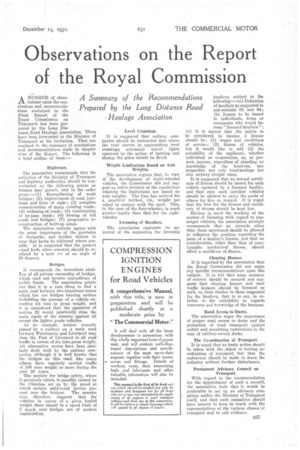Observations on the Report of the Royal Commission
Page 43

If you've noticed an error in this article please click here to report it so we can fix it.
A Summary of the 'Recommendations Prepared by the Long Distance Road Haulage Association
A NUMBER of obeer
vations upon the conclusions and recommendations contained in the Final Report of the Royal Commission on Transport has been prepared by the Long Distance Road Haulage Association. These have been forwarded to the Minister of Transport at his invitation. They are confined to the summary of conclusions and recommendations made in chapter nine of the Report. The following is a brief outline of them : Highways.
The association recommends that the activities of the Ministry of Transport and highway authorities should be concentrated on the following points as finance may permit, and in the order given :— (1) Strengthening of weak bridges ; (2) improvement of road junctions and lines of sight ; (3) complete reconstruction of many existing roads ; (4) widening of roads; (5) construction of by-pass roads; (6) freeing of toll roads and bridges; (7) progressive reconstruction of built-up areas.
The association entirely agrees with the great importance of the provision of footpaths, and further desires to urge that kerbs be whitened where possible. It is suggested that the present edged kerb, when renewed, should be replaced by a kerb set at an angle of 40 degrees.
Bridges.
It recommends the immediate abolition of all private ownership of bridges, which need not involve expenditure of
Public funds. The association points out that it is a rare thing to find a main road between two important towns -which has not bridges bearing notices forbidding the passage of a vehicle exceeding six tons in gross weight, and it is considered that the operation of seetion 25 would practically close the main roads of the country against all except the lighter goods vehicles.
As an example, notices recently placed by a railway on a main road between Warrington and Liverpool may close the Port of Liverpool to all road traffic in excess of six tons gross weight. All alternative routes have been similarly dealt with by the railway companies, although it is Well known that the bridges on this road; like many others have regularly carried traffic of 100 tons weight or more during the past 20 years.
The anxiety for bridge safety, where it genuinely exists, is possibly caused by the vibration set up by the speed at which certain solid-tyred lorries pro
ceed over the bridges. The association, therefore, suggests that for vehicles in excess of a given loaded weight there should be a speed limit of 5 m.p.h. over bridges not of modern construction.
Level Crossings.
It is suggested that railway companies should he instructed that where the road curves in approaching level crossings, automatic signal lights operated by the action of opening and closing the gates should be fitted.
Weight Limitations Based on Axle • 'Weights.
The association regrets that, in view of the development of multi-wheeled vehicles, the Commission elid not suggest an entire revision of the regulations whereby the limitations are based on axle weights. The time has arrived for a practical method, viz., weight per wheel in contact with the road. This, in the case of the four-wheeler, is much greater legally than that for the eightwheeler, Licensing of Hauliers.
The association expresses its approval of the suggestion for licensing hauliers, subject to the following :—(a) Definition of hauliers as suggested in sub-sections 63 and 64; (b) ,licence to be issued to individuals, firms or companies who would become " licensed hauliers "; (e) it is agreed that the points to be considered in issuing a licence should be : (I) wages and conditions of service ; (2) fitness of vehicles, but it would like to add (3) the suitability of the applicant, whether individual or corporation, as, at present, anyone, regardless of standing or knowledge of the business, can jeopardize not only road-haulage but also railway freight rates.
It is suggested that an annual certificate of fitness should be issued for each vehicle operated by a licensed haulier, and that only such certified vehicles should be allowed to carry the goods of others for hire or reward. It is urged that the fees for the licence and certificate of fitness should be kept low.
Having in mind the working of the system of licensing with regard to passenger vehicles, the association strongly recommends that no grounds other than those mentioned should be allowed to influence the position regarding the issue of a haulier's licence, and that no consideration, other than that of questionable mechanical fitness, should. affect a certificate of fitness.
Clearing Houses.
It is regretted by the association that the Royal Commission did not make any specific recommendations upon this subject. It is felt that some measure of control should be secured and suggests that clearing houses and road traffic brokers should be licensed as such, on lines similar to those suggested for the hauliers, that is to say, in relation to the suitability as regards resources and knowledge of the business.
Road Access to Docks.
The association urges the importance of proper road access to docks and the protection of road transport against unfair and penalizing restrictions in the case of railway-owned docks.
The Co-ordination of Transport.
It is urged that no hasty action should be taken with the object of forcing coordination of transport, but that the endeavour should be made to leave the industry without further disturbance.
Permanent Advisory Council on Transport.
With regard to the recommendation for the appointment of such a council, the association feels that it would be Preferable to set up an advisory committee within the Ministry of Transport itself, and that such committee should have powers to keep in touch with the representatives of the various classes of transport and to call evidence.




































































































